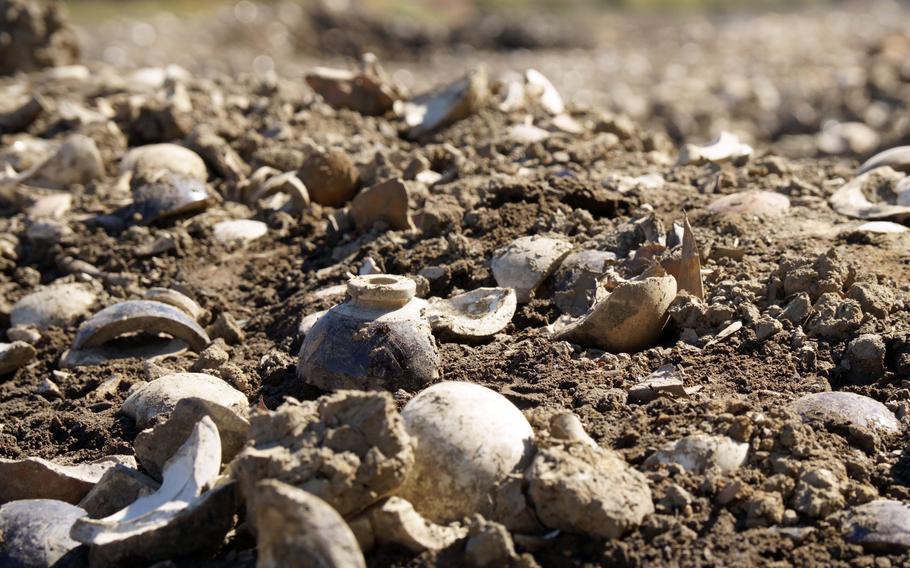
Late in World War II, with iron supplies running low, Japan’s military ordered potters to make grenades. When the war ended, ammunition factories north of Tokyo closed and workers smashed thousands of unused grenade casings on the bank of the Binnuma River. (Akifumi Ishikawa/Stars and Stripes)
KAWAGOE, Japan — A neighborhood at the edge of the Tokyo metro area went one better than turning swords into plowshares. Its residents turned ceramic grenade casings into flower vases and garden ornaments.
Thousands of the World War II-era casings litter Kawagoe city’s Kugedo neighborhood in Saitama prefecture, where a long-demolished munitions factory made them for the imperial armed forces. Late in the war, with iron supplies running low, Japan’s military ordered potters all over the country to make grenades.
Locals turned the old casings into flower holders and garden ornaments, according to retired electrician Sadao Tokita, 83. He keeps half a dozen or more, along with a large pottery landmine, in a wooden box in his backyard.
The empty grenades aren’t dangerous since they were never armed with gunpowder or shrapnel, he said during a Feb. 28 visit to Kugedo.
They were discarded at the end of the war when the ammunition plant was shut down under the supervision of American troops, said Tokita, who grew up in the area as the son of a Japanese soldier who worked at another nearby arms factory.
Aerial photographs from the 1940s show the ammo plants surrounded by farmland. Today, a large shopping mall occupies the site of one factory and much of the area is built up.
Tokita’s childhood memories include watching U.S. B-29 bombers fly overhead and seeing the glow of fires burning in Tokyo after nighttime air raids.
“Soldiers shot at the planes, but they flew too high to hit,” he recalled.
When the war ended, the ammunition factories closed and workers smashed thousands of unused grenade casings on the bank of the nearby Binnuma River.
Tokita recalled the bitter taste of gunpowder from the factory.
“Wind would blow, and gunpowder would fill the air,” he said. “They couldn’t grow anything in the fields because of the gunpowder.”
Farmers had to churn soil to bury the gunpowder and make the land fertile again, Tokita said. Children collected the ceramic grenades but found them too heavy to throw.
Ammunition boxes scattered around the neighborhood were more popular as toys, he said. Boys would make small boats out of them to float in a water tank.
Like larger munitions, such as aerial bombs dropped by U.S. aircraft during the war, the grenades sometimes pop up in unexpected places.
In September, Misawa Air Base in northeast Japan ordered people to shelter in place after an airman brought home a Japanese Imperial Navy Type 4 ceramic grenade that he recovered while scuba diving nearby.
The old grenades are all that’s left of the munitions factory that stood near Tokita’s house. Massive earth barriers that were built to shield it were bulldozed long ago, he said.
However, it’s possible to see what’s left of thousands of grenades from the bank of the Binnuma.
Pottery shards from the old weapons fill the riverbed and people come to search for unbroken grenades when the water level is low. Someone has helpfully left a couple of shovels nearby for souvenir hunters.

Late in World War II, with iron supplies running low, Japan’s military ordered potters to make grenades. When the war ended, ammunition factories north of Tokyo closed and workers smashed thousands of unused grenade casings on the bank of the Binnuma River. (Akifumi Ishikawa/Stars and Stripes)